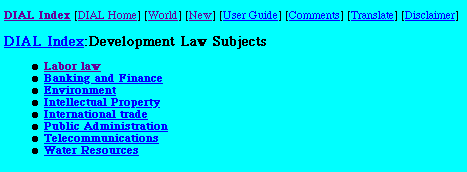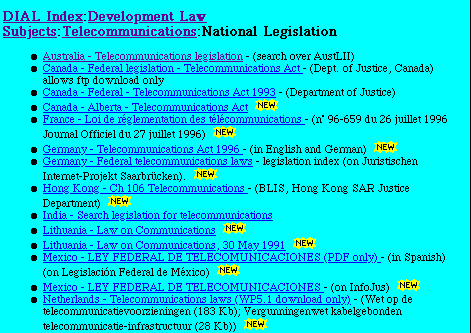[Previous]
[Next]
[Up]
[Title]
5.3. The Development Law Subject pages
The Development Law Subject pages will be the core of DIAL Index as it develops
further, and is where most of the innovative features of DIAL Index are found.
However, these pages are the last stage or layer of development of the
prototype, as the legislation, law reform and other pages had first to be
developed in order to allow the Development Law Subject pages to be
constructed. There are eight example Development Law Pages under construction
in the prototype, at various stages of completion.

The Legislation, Law Reform and other DIAL pages are the sources of the
legislation-related `raw material' from which the Development Law Subject pages
are built. Once a legislative, law reform or other source is located and
indexed (and the best ways of searching or browsing it determined), then it is
also used to add new links relating to the Development Law Subject pages.
The Development Law Subject pages for Telecommunications will be used as an
example of this approach, and what can be achieved. The opening page leads to
pages for National Legislation (the key resource), International Agreements and
Organisations, Indices and DIAL Searches for telecommunications topics.

http://www.austlii.edu.au/links/DIAL_Index/Development_Law_Subjects/Telecommunications/
The `Indices' page provides links to other Internet law indexes
dealing with a telecommunications, and the `International agreements and
organisations' page has links to the International Telecommunications Union
(ITU), European Union activities concerning telecommunications etc. The `DIAL
Searches for telecommunications topics' page is discussed later.
The most important part of the Telecommunications pages is the
National Legislation page, which provides access, in different forms, to
telecommunications laws from 18 jurisdictions: Australia (Commonwealth, NSW,
South Australia), Canada (Federal, Alberta); France; Germany; Hong Kong SAR;
India; Lithuania; Mexico; Netherlands; New Zealand; Norway; South Africa;
United Kingdom; United States; and Vietnam. The legislation collections of over
50 countries on the Legislation page (discussed above) were checked but only
these 18 jurisdictions contained telecommunications legislation.

Part of the Telecommunications' Development Law Subject page
The main purpose of this page is that it allows the user to go
directly to available telecommunications legislation from 18 jurisdictions
without having to know which of the 50 countries known to have legislation on
the web may have telecommunications laws in their collections. It also provides
the user with the best ways to find the telecommunications laws within those
national collections, something which will often only be apparent to someone
with a reasonably high level of expertise in Internet research.
Some other development law subjects which already have specialised centralised
collections of legislation on the Internet, such as labour law or environmental
law, would yield a higher number of items of national legislation on the web,
but telecommunications was chosen for demonstration purposes precisely because
there was no known pre-existing collection. In our view, from our knowledge of
the available legislation collections, comprehensive indexing of these
collections for other development law subject areas is likely to produce
collections of an average size similar to this telecommunications collection.
In broad legal areas such as `intellectual property' the total will be higher
(particularly as national patent offices often have web sites), but in more
specialised areas such as `privatisation' the number will often be less.
The 'Telecommunications' Development Law Subject page demonstrates both the
wide range of national statutory materials available, and the variety of access
mechanisms that must be utilised by an Internet indexer to create maintainable
Internet law indexes. These techniques will now be discussed by use of this
page as an example, progressing from the most preferred to the least preferred
method.
In some cases, because of the differing strengths and weaknesses of each
approach, it has been prudent to create multiple links to the same
jurisdiction, such as in the United States entries below.

Four entries for the United States on the `Telecommunications:
National Legislation' page
In this case, because the US Code is only consolidated to
January 1996, a separate entry for the Telecommunications Act of 1996 is
necessary.
If a local collection of legislation has its own search engine, and that search
engine can be used to effectively search for all telecommunications
legislation, and the URL for the results of that search is stable and can be
copied, then this `search URL' should be used as the hypertext link for
telecommunications legislation for that country - an `embedded search' or
`stored search'.
Embedded searches using local search engines were possible and used for
Australia, India, and the United States on the Telecommunications page.
The Australian entry is an embedded search over the titles of all available
Australian legislation for `telecommunications'[124]. It finds 138 pieces of legislation at the time of
writing, whereas it found 133 when first implemented. This illustrates how an
embedded search is, in effect, `self updating' and does not require regular
maintenance if well-implemented. In this case the choice was made to search
only over the titles of the legislation, not the full text, as that gives a
precise list of telecommunications Acts and Regulations in Australia, not just
those that mention `telecommunications'.
The United States entry shows two approaches to using searches. One entry is an
embedded search for `telecommunications' over the entire US Code (located on
Cornell's Legal Information Institute). The other entry shows an intermediate
solution, as it takes the user to a search screen which allows searches to be
limited to within the relevant title of the US Code (Title 47).
The Indian entry (the search engine on the Lok Sabha site) only allows a search
over the full text of Acts, so Acts which simply mention telecommunications are
included.
In the case of Vietnam, the local site does not have its own search entry, but
the entry `Vietnam - DIAL Search for telecommunications - (over Batin & Co
site)' on the Telecommunications Page results in a search of the DIAL Search
facility which is limited to the Vietnam legislation collection on the site http://www.batin.com.vn/vninfo/.
This illustrates how the targeted web spider can be used to provide a search
facility limited to a particular local site which does not have its own search
facility. This has a similar benefit to embedded searches over a local site, in
that as the web spider updates the collections it indexes, the embedded search
will also find any new telecommunications legislation that has been added.
The same technique could have been used over other legislation sites which have
been made searchable by the web spider, such as those in Mongolia, Zambia,
Israel and Turkey, but a test search for telecommunications over these sites
produced no hits and we considered it preferable to only add embedded searches
after they produce some result.
In five of the collections (Germany, Hong Kong, New Zealand, the United
States[125], and Vietnam), it has been
possible to create a link to a location on the local site where a legislation
subject index or table of contents is provided, to the point where legislation
concerning telecommunications is likely to be listed (rather than to the
specific Acts). This has the advantage that if new legislation is added to the
collection, a link to it is likely to be found at this index/table of contents
location.
This is the simplest and most common method of creating Internet indexes to
legislation on specific topics, but it is in some ways the least satisfactory,
because it has no capacity at all to reflect when new pieces of legislation are
added to a national collection.
The page contains links to specific statutes in Canada, France, Germany,
Lithuania, Mexico, Norway, the United Kingdom and the United States. This
approach is necessary where there are no subject indexes provided to the
legislation (if there was, it would be better to link to the
`Telecommunications' entry rather than specific statutes), no local search
engines where embedded searches can be used, and the legislation has not (yet)
been made searchable via DIAL Search. It is also useful where one of the
preferred techniques is also used, to provide an additional direct link to
known high-value pieces of legislation.
[124]
http://search.austlii.edu.au/do2/srch.pl?query=telecommunications&selection=au%2Flegis&searchscope=legisname&searchtype=boolean+short&numhits=100
[125] The entry `United States - (Browse)
Title 47, US Code - Telegraphs, Telephones, and Radiotelegraphs'
[Previous]
[Next]
[Up]
[Title]




